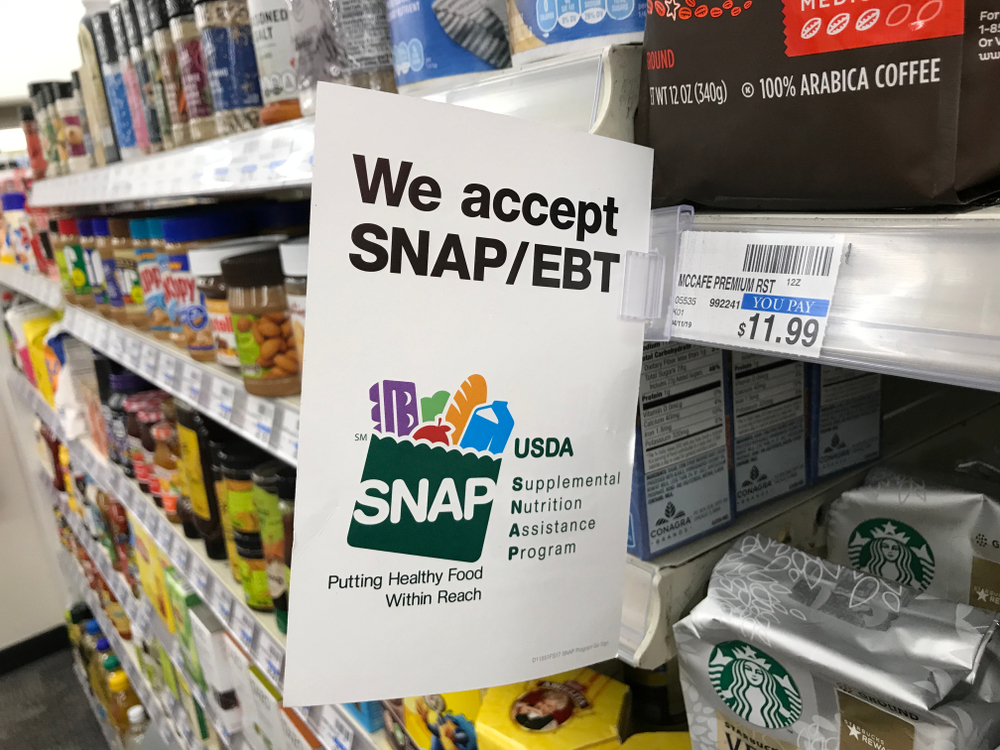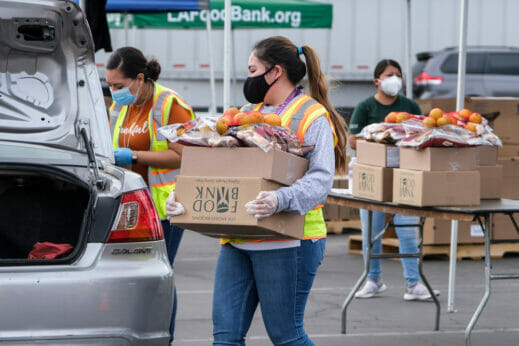New proof of work requirements were added to the Fiscal Responsibility Act, a deal to avoid breaking the debt ceiling. But they have become a thorny issue among lawmakers and anti-hunger advocates.

New work requirements for the Supplemental Nutrition Assistance Program (SNAP) have advocates worried that the hunger epidemic across the country will worsen. The Fiscal Responsibility Act, a bipartisan deal to avoid the national debt ceiling, adds new conditions in order to receive the food stamp benefits.
Previously, SNAP requirements stated that “able-bodied” adults 18-49 years old without dependents had to show they were enrolled in a job training program or worked for at least 80 hours a month in order to receive assistance. The legislation, signed into law by President Biden earlier this month, stretches that age range to 54 years old, although veterans, the homeless and young adults who were previously in foster care are exempted. The change is expected to be implemented gradually, according to the USDA. In October 2023, adults aged 50-52 will have to abide by the new rules. By the fall of 2024, adults up to 54 will have to adhere to new proof-of-work standards.
Republicans who were involved in finalizing the debt ceiling legislation, notably House Speaker Kevin McCarthy, plugged the new work requirements as a win for welfare reform, by “putting people back to work.”
But advocates such as Gina Plata-Nino, deputy director for SNAP at the Food Research & Action Center, reject those assertions. She says there’s simply no evidence to indicate a proof-of-work requirement is an effective policy measure in growing the workforce.
“This largely comes down to a misunderstanding of how difficult it is for low-income Americans to access these programs and, unfortunately, it’s going to be the cause of food insecurity rates spiking,” she says.
Approximately one in 10 Americans experience food insecurity, but food banks and charities across the country have recently noted an uptick in demand. Last month in Boston, the line for the American Red Cross Food Pantry stretched the length of two football fields, exceeding some of the worst periods during the pandemic, while simultaneously reaching the second-highest monthly traffic since it opened 41 years ago. In April, more than half of the shelves were bare at the Atlanta Community Food Bank. And in central Ohio, Reuters reported that the number of households seeking food bank aid has increased by nearly half since last year.

Photography by Ringo Chiu on Shutterstock
Plata-Nino points to a study from the American Economic Association, analyzing SNAP’s work-reporting requirement. It found that the reporting requirements do not “increase economic self-sufficiency.” The research also showed a 53-percent reduction in program participation. On the contrary, she notes that when SNAP benefits were issued during the pandemic, it reduced poverty by 9.6 percent and child poverty by 14 percent in states with emergency allotments.
Additional studies have shown that every $1 invested in SNAP benefits yields between $1.50 and $1.80 in economic activity during economic downturns.
The debt ceiling legislation falls on the heels of a Congressional decision to end pandemic-era emergency allotments to the SNAP program, which will impact more than 41 million Americans. Ed Bolen, director of SNAP state strategies at the Center on Budget and Policy Priorities, notes this earlier decision and says the additional changes to SNAP will likely push more marginalized groups farther into a state of poverty.
“It’s very unfortunate to see that in negotiations on what’s required for the government to keep its debt obligations and pay its bills, people think it’s worth taking away a program that provides basic food assistance to low-income folks,” he says. “The older you get, the more health challenges you experience and the harder it is to find a job.”
The Center on Budget and Policy Priorities released estimates that some 750,000 adults aged 50-54 will lose food assistance as a result of increasing the age on the proof-of-work requirements.
If individuals are unable to find work, and they are subsequently cut off from the program, it could exacerbate or create health challenges, says Bolen. This creates a dangerous cycle for already marginalized Americans. He adds that the new exemptions will be as much of a burden on eligible groups as they will be on the state agencies who will be tasked to fill out paperwork and provide documents to check all the boxes.
Both Bolen and Plata-Nino believe the success of the exemption will largely depend on the resources of individual states, the training provided to caseworkers and how well the USDA co-ordinates and collaborates on the roll-out.
Modern Farmer contacted the USDA to inquire about next steps and co-ordination plans with states to ensure eligible groups are supported in the exemption process.
“The Fiscal Responsibility Act contains important exemptions from work requirement time limits for homeless individuals, veterans, and youth aging out of foster care, who often face significant barriers to employment that make it difficult to meet work requirements,” a USDA spokesperson wrote in an email.
“We are working diligently to review the legislation, communicate with state agencies, work with our federal partners at the Departments of Housing and Urban Development, Veterans Affairs, and Health and Human Services, and issue guidance as expeditiously as possible to meet the parameters of the law.”
Despite the debt ceiling legislation being signed into law, there is a handful of Democrats who also oppose the SNAP changes and say they will continue to put up a fight. On June 7, House Democrats who sit on the Agriculture Committee also took a stand against the bill’s measures.
Rep. David Scott, ranking member on the committee, told Modern Farmer he will “fight tooth and nail” to oppose any “legislative vehicle” that makes access to food more difficult.
“We have the resources and farming capacity to feed every single American. We should take pride in SNAP and our ability to lift millions out of poverty by ensuring they have access to food until they’re able to stand on their own two feet,” Scott wrote in an email, where he noted that 43 percent of all SNAP participants are children. “Politicians who want to increase hunger in America should expect fierce resistance. I won’t stand for it.”
Although Scott did not elaborate on how he plans to rectify the recent SNAP changes, those who are part of advocacy and food policy circles say there’s an opportunity to do so in the 2023 Farm Bill. The Food Research & Action Centre has already proposed a slate of measures that includes expanding SNAP benefits for immigrants, people with disabilities and college students with lower incomes and eliminating three-month time limits on SNAP eligibility for certain working-age adults who cannot document sufficient hours of work, allowing benefits to be used at more food retailers.
The Congressional Budget Office’s recent baseline projects that the next Farm Bill in the United States will cost US$1.51 trillion, making it the most expensive one in the country’s history, with 80 percent of the spending accounting for nutrition assistance.
Thing is people on SNAP go to work the next month they are cutting the snap benefits so much u can’t afford to feed your family. They give u no time to somewhat get on your feet and be stable. It’s like get a job we take everything away. you give exceptions an more help to the immigrants then u do the American people we are struggling too. U wanna know what keeps on expanding are budgets it’s letting all these immigrants in and paying for them. Wake up take care of the American ppl first!
Doing this is only going to force individuals into going into “survival mode” because not being able to afford to eat they are going to be forced into choosing between a roof over their family’s heads or putting food on the table. The next thing that is going to cause them to get caught up in the legal system and getting theft charges for trying to steal food to survive! This is unfair in so many ways!